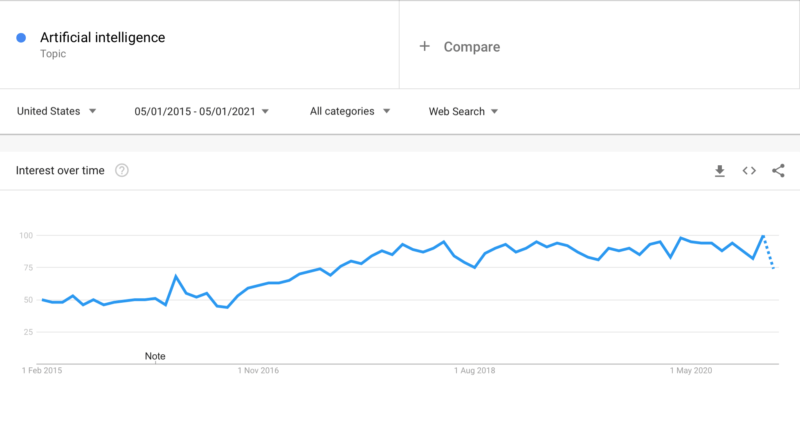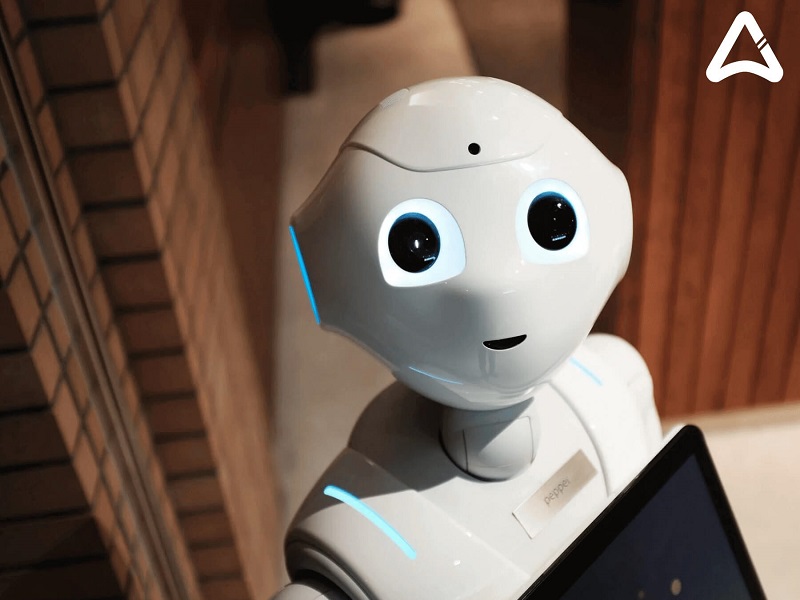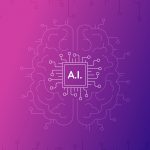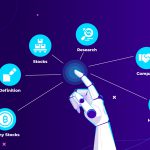Speculation and interest in AI application development is relied upon to increment in the long term. Therefore, as the top AI use cases that will open critical monetary worth are reachable. Also, these use cases are probably going to emerge, as upgrades are normal in the 3 structure squares of Artificial Intelligence: more information accessibility, computing, and better calculations.
Short-term changes are difficult to predict, and we could experience another AI winter. However, it would likely be short-lived. So let’s jump to different sections to see recent trends and the future of artificial intelligence.
Interest in AI Has Been on The Rise
According to AppStudio’s experts, the number of active AI startups increased approx 110% between 2015 and 2018. Because of late progressions in deep learning, AI is as of now driving web search tools, online interpreters, virtual assistants, and various sales decisions and marketing.
However, between 2015-2018, the popularity of AI grew to 2-3 times the level in 2015. However, interest is fairly flat since 2018. COVID-19 does not appear to have increased or decreased interest in AI.

Artificial Intelligence Trends 2021
Conversational AI
AI fueled chatbots, otherwise called conversational AI, improve the scope, responsiveness, and personalization of the client experience. According to a leading mobile app development company, conversational artificial intelligence solutions are transformed into better customer service automation. To better understand what humans say and need, an AI-powered chatbot uses natural language processing and machine learning to provide a more natural, almost human-level interaction.
The Role of AI in Healthcare
Big Data has been used extensively to identify COVID patients and critical hotspots. The Artificial Intelligence app development is already helping the healthcare sector to a great extent with high precision. Additionally, researchers have developed thermal cameras, and mobile apps to monitor individual temperatures and collect data for healthcare organizations.
Check Out- Benefits of Artificial Intelligence in Healthcare
By leveraging data analysis and predicting various outcomes, artificial intelligence can help healthcare facilities in several unique ways. The AI and ML instruments provide information on human health and recommend preventive steps to prevent the spread of disease. Artificial intelligence solutions also help clinicians remotely track their patients’ health, promoting teleconsultation and remote care.
RPA
More CIOs are going to a developing innovation practice called Robotic Process Automation (RPA) to smooth out business cycles and lower costs. With RPA, organizations can automate tedious rule-based business processes, allowing their workforce to spend more time serving customers or other higher-value work.

Robotic Process Automation (RPA) aims to automate business processes governed by business logic and organized inputs. RPA solutions can range from something as easy as producing an automated email response to implementing thousands of bots, each programmed into an ERP system to automate rule-based tasks. RPA is being rolled out in verticals such as manufacturing, KPO, HR, and finance.
AI for Cybersecurity and Knowledge Gap
In the coming years, knowledge will become more accessible, and digital data will be at a higher risk of being compromised and exposed to hacking and phishing attacks. Artificial intelligence and emerging technology will provide the security department with support in all areas against malicious activities. AI will help deter cybercrime in the future with better cybersecurity measures. The AI-enabled framework will detect fake digital transactions or activities that match crime trends.
Edge Computing
Edge computing provides servers and data storage devices to access their devices and allows them to enter data on them. It is defined as real-time data processing and is more powerful than cloud computing services. There is another instance of edge computing that takes place in nodes. It is a mini server located near a local telecommunications provider. The nodes help build a bridge between the local service provider and the cloud. As a result, it costs less, saves time, and provides customers with fast service.
AI-powered Business Analytics and Forecasting
Artificial intelligence solutions help redefine business processing with real-time alerts. The researchers combined hyper-automation with cognitive automation to fully understand market needs. Smart content technologies, along with practices supporting artificial intelligence, will help digital workers develop outstanding skills. Such abilities can help them manage natural language automation, judgment, setting arrangement, information related bits of knowledge, and reasoning.
What are the Future Technologies That AI will Enable?

AI use cases will shape AI development. The availability of capital depends on the use cases, and the most valuable use cases would motivate companies and the government to invest more.
Improving AI will make our smart systems even smarter. For example, our cars will drive themselves, houses will adjust their use of electricity, and robots will diagnose our diseases. In other words, AI will cover more in our lives and automate our daily tasks. Here are some use cases for AI technologies that currently exist with fairly limited functionality or limited scope. Improving these technologies will unlock significant value.
Cloud Computing
Cloud computing expects to create a system where you can accomplish computing functions at whatever point you need. The integration of AI will help AI models access information from the cloud, train and apply new knowledge in the cloud. This allows other AI models to learn from these new insights. This fusion improves computing power and the ability to process a lot of data and intelligence. Potential cloud computing use cases include AI drones, sensor networks, and smart dust.
Convergence of IoT and AI
Another trending technology, IoT app development, will merge with artificial intelligence technologies in the future. For example, AI can be used on IoT platforms to use root cause analysis, predictive machine maintenance, or outlier detection. Devices such as cameras, microphones, and other sensors collect this data from video frames, speech synthesis, or other means. Then you train in the public cloud environment with advanced AI technologies based on neural networks.
Smart Algorithms Offer Future Prospects
The COVID-19 pandemic has paralyzed the world’s economies, and many sectors are struggling to survive. There are innovative ways to help us on the road to recovery, but businesses and institutions must focus on creating a strong, technology-based competitive advantage. AI-powered applications are growing exponentially, both in number and scope, and researchers and scientists continually find new ways to use AI to design high-value products and services. Therefore, if you are looking for a reliable partner to develop an artificial intelligence application, please contact us to know how to help your business with AI, annotation services, and machine learning.
Frequently Asked Questions
Q1. How is AI helping our life?
Virtual digital assistants have changed the way we go about our daily tasks. Natural language skills and the ability to learn independently without human interference are the reasons they are developing so fast. Also, they become human-like in their interaction, only smarter and faster.
Q2. Are Alexa and Siri AI?
As Alexa, Siri is also an artificial intelligence that uses advanced machine learning technologies to function.
Q3. Where is AI used?
Artificial intelligence is used in all industries globally. Some industries that have delved into AI to find new applications are healthcare, gaming, e-commerce, retail, security, and surveillance. Automotive among others, Sports Analytics, and Manufacturing and Production,.




very good and informative article i like this.